Profiling Our 'Centennial Players'
This is the first of a weekly series featuring musicians of the San Francisco Symphony, performing in concerts of the orchestra’s centennial season:
Jonathan Vinocour, Principal Viola
Appointed to the first chair in 2009, succeeding Geraldine Walther who held that position for three decades, the 32-year-old violist arrived here with a long, impressive resume. Vinocour had served as principal violist of the Saint Louis Symphony Orchestra and guest principal of both the Gewandhaus Orchestra of Leipzig and the Orchestra Ensemble Kanazawa in Japan.
Originally from Rochester, N.Y., Vinocour graduated magna cum laude from Princeton University in 2001 with a degree in chemistry, and won the University’s Sudler Prize in the Arts. He completed his master’s degree at the New England Conservatory of Music in 2003, where he studied with Kim Kashkashian.
A frequent soloist, Vinocour recently received first prize in the Holland America Music Society Competition, and recorded his first solo album.
Steven Dibner, Bassoon
The associate principal bassoonist is the only musician in a family of scientists. Born in Ann Arbor, Mich.,
Dibner had to give up the clarinet at age 8 because of two missing baby teeth, and took up the violin.
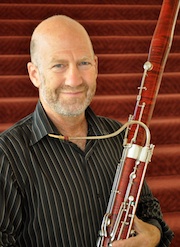
In high school, teeth intact, he played the bassoon, and at Indiana University he majored in music and languages, picking up Italian, French, and “tour German.” A master’s degree at Juilliard was followed by orchestra positions, including the Metropolitan Opera Orchestra, before joining SFS in 1983.
Here, he also formed a chamber orchestra he is conducting. His electric car is charged from solar cells on the roof of his Noe Valley home; he is proud of the fact that both the car battery and solar-panel technology were invented by family members.
Free Symphony for Soldiers Then
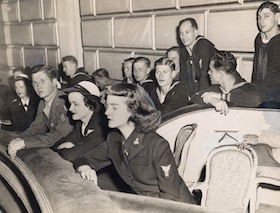 In a weekly sampler of photos from the San Francisco Symphony’s 100-year history, today’s is from opening night, 1943, as the city filled up with military. Members were given free admission to concerts throughoutthe war.
In a weekly sampler of photos from the San Francisco Symphony’s 100-year history, today’s is from opening night, 1943, as the city filled up with military. Members were given free admission to concerts throughoutthe war. The buildup of the Pacific front here was so heavy that in the same year, Mayor Rossi asked hotels to provide more sleeping space for soldiers by putting cots in dining rooms and ballrooms. Construction began on barracks for servicemen in the Civic Center.
Concerts took place in the War Memorial Opera House, home to SFS for most events from 1932 until Davies Hall opened in 1980. The Opera House was also the venue for the two-month-long founding conference of the United Nations in 1945; in 1951, the Treaty of San Francisco was signed there, formally ending the war with Japan.
Soldiers were not only in the audience in the Opera House. In 1943, more than 300 soldiers participated in the production of Irving Berlin’s This Is the Army, closing a national tour. Ticket revenue went to the Army’s Relief Fund.
Incidentally, it took a quarter century before the War Memorial filled the void left by the destruction of the Grand Opera House in 1906; that was a 4,000-seat hall at Mission and 3rd streets.
Free Opera for Veterans Now
In support of the San Francisco Veterans Memorial Project, the San Francisco Opera is opening the final dress rehearsal of Heart of a Soldier on Sept. 7 to veterans, their families, and guests, free of charge.Admission by guest pass only, limit of four guest passes per person; register at the Marines’ Memorial Web site. A reception is being held in the Opera House main lobby, beginning at 7 p.m.
Word to the wise: Sept. 7 is also the gala opening for the San Francisco Symphony centennial season, so traffic and parking in the Civic Center will be no picnic. (Not that it ever is.)
Granger's Last Season in Santa Cruz
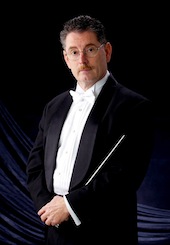 After 20 years of heading the Santa Cruz County Symphony, John Larry Granger is retiring. He will conductconcerts in the next season and will remain music director during the 2012–2013 season, in which guest conductors will vie for the position.
After 20 years of heading the Santa Cruz County Symphony, John Larry Granger is retiring. He will conductconcerts in the next season and will remain music director during the 2012–2013 season, in which guest conductors will vie for the position. During Granger’s tenure — the longest in the orchestra’s 53-year history — the California Arts Council awarded the organization the highest ranking of artistry in its class.
Granger will conduct a season of personal significance: Dvořák’s Symphony No. 8, which he conducted at his audition concert in 1991; Brahms’ Symphony No. 4, the first major work he studied in detail at the Institute of International Conducting in 1979; and Saint-Saëns’ Organ Symphony, which influenced his love for classical music as a child.
Opening the season on Oct. 1 and 2, along with the Dvořák symphony, will be the Mendelssohn Violin Concerto, with New York Philharmonic Associate Concertmaster Sheryl Staples as soloist. A “concert concerto” on Nov. 12 and 13 will bring together Klein Competition winner Nikki Chooi (in the Beethoven Violin Concerto), 2009 Van Cliburn Competition finalist Chetan Tierra (Tchaikovsky Piano Concerto No. 1), and Aaron Miller (Mozart Piano Concerto No. 24).
Concerts in 2012 will feature the music of Delius, Poulenc, Saint-Saëns, Nielsen, Berwald, Estrella de Soria, Mendelssohn, and Vaughan Williams on Jan. 28–29, Feb. 27–28, March 24–25, and May 12–13.
Mozart's Sister
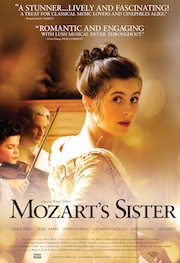 You may remember “Nannerl” vaguely as Mozart’s older sister. Even as Rosencrantz and Guildensternremained minor figures in Hamlet until Tom Stoppard immortalized them, Maria Anna Walburga Ignatia Mozart (1751–¬1829) has been waiting for centuries to emerge from the shadow of Amadeus. The time is here.
You may remember “Nannerl” vaguely as Mozart’s older sister. Even as Rosencrantz and Guildensternremained minor figures in Hamlet until Tom Stoppard immortalized them, Maria Anna Walburga Ignatia Mozart (1751–¬1829) has been waiting for centuries to emerge from the shadow of Amadeus. The time is here. Maria Anna (daughter of Anna Maria and Leopold Mozart) is the focus of a new film, to be shown at Embarcadero Center Cinema, beginning Sept. 16.
The title role of Mozart’s Sister — written, directed and produced by René Féret, director of 15 films, all little-known in the U.S. — is played by Marie Féret, the director’s daughter. She was five years older than Wolfgang (David Moreau) and a musical prodigy herself.
Originally, she was father and entrepreneur Leopold’s star attraction in various courts, but soon Wolfgang eclipsed her completely. As she grew up, she was forbidden to play the violin or compose, and, chafing under the restrictions — in the semifictional film — she used her friendship with the son and daughter of Louis XV for liberation ... of sorts.
The film score, not surprisingly, is by the two Mozarts, along with music by Marie-Jeanne Serrero.
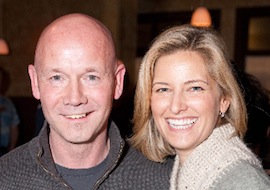
To realize Leggat’s plan of radical expansion, the organization needed a theater of its own. After trying and failing to obtain the Clay, the solution came with the leasing of the former VIZ Cinema in the New People Building in Japantown. The recently built, 143-seat, state-of-the-art basement theater, with an excellent sound system, reopens as a Film Society venue, screening Jean-Luc Godard’s 2010 Cannes Festival–acclaimed Film Socialisme.
It’s a questionable choice, even if a measure of adventure and avant-garde are expected from the Film Society. Godard, 80, is a “New Wave” great. His existentialist masterpieces started spectacularly with Breathless in 1960. But Socialisme is a confused and confusing mess, called by one (sympathetic) reviewer a “docufiction on diverse subjects mixing untamed genius with occasional, violent yawniness.”
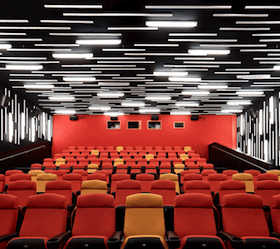
Documentary and fiction are mixed in baffling sequences about a cruise with Nazi hunters, bankers, and singer Patti Smith; family life at a French filling station; an incomprehensible series of historic footage; and a disjointed travelogue to Egypt, Palestine, Odessa, Greece, Naples, and Barcelona. To make it all even worse, there are Godard’s own subtitles of deliberately misspelled “Navajo English” nonsense, such as “nochoice south latitude” and “loss reality fragrant.”
A good reason to see Socialisme is to experience a great filmmaker either in his dotage or rejuvenated to the point of youthful experimentation.
Steven Jenkins, acting executive director of the Film Society, says of the beginning of daily screenings:
At this stage of becoming a presenter of foreign, independent, documentary and special-interest fare, there is no finer or more appropriate venue for us than the orange-and-yellow-seated gem so beautifully ensconced within the bright and shining New People Building, in the heart of the city’s vibrant and diverse Japantown.Film Socialisme runs through Sept. 8. The schedule after that: Puzzle, from Argentina, Sept. 9–15; Aurora, from Romania, Sept. 16–21; Hong Kong cinema series, Sept. 23¬–25; Film Arts Forum, Sept. 27.I’m convinced that moviegoers will share our love of the theater’s elegant design, comfy environs and downright cool vibe, and we look forward to welcoming audiences from the Bay Area and beyond into this epicenter of the Film Society’s public programming. Our “Home Sweet Home” sign has a wall on which to hang at long last.
Opera News Honors
Opera News magazine’s 2011 honors went to Karita Mattila, Anja Silja, Dmitri Hvorostovsky, Peter Mattei, and Peter Sellars.Previous awards, with San Francisco Opera Merola Program alumni in italics:
2005: James Conlon, Régine Crespin, Plácido Domingo, Susan Graham, Dolora Zajick
2006: Ben Heppner, James Levine, René Pape, Renata Scotto, Deborah Voigt
2007: Olga Borodina, Stephanie Blythe, Thomas Hampson, Leontyne Price, Julius Rudel
2008: John Adams, Natalie Dessay, Renée Fleming, Marilyn Horne, Sherrill Milnes
2009: Martina Arroyo, Joyce DiDonato, Gerald Finley, Philip Glass, Shirley Verrett
2010: Jonas Kaufmann, Riccardo Muti, Patricia Racette, Kiri Te Kanawa, Bryn Terfel
Reminder: BBC Proms Are in Full Bloom

On the Proms site, you will find podcasts of the past week’s concerts along with information about what’s coming.
Most live broadcasts begin at 11 a.m. PDT, and, skimming just from the top, here are some events not to be missed:
- Tomorrow, Yo-Yo Ma premieres Graham Fitkin’s Cello Concerto, and David Robertson conducts Beethoven’s Symphony No. 9; the soloists: Christine Brewer, Karen Cargill, Toby Spence, Iain Paterson.
- Day after tomorrow (could that be September? yes it could), Zubin Mehta conducts the Israel Philharmonic in works by Webern, Albéniz, and Rimsky Korsakov; Gil Shaham is soloist in Bruch’s Violin Concerto No. 1.
- Sept. 2, Iván Fischer conducts the Budapest Festival Orchestra in works by Liszt and Mahler, featuring pianist Dejan Lazic. (San Francisco’s Barnaby Palmer, music director of the late, lamented Lyric Opera here, is Fischer’s assistant.)
Baroque Splendor in Palo Alto
Thomas Shoebotham’s Palo Alto Philharmonic is presenting its second annual preseason concert of Baroque music on Sept. 10 in the First Baptist Church.The rich program includes Bach’s Brandenburg Concerto No. 5; the suite from Purcell’s Dido and Aeneas; Vivaldi’s Sonata in B Flat for Cello and Harpsichord; Gabrieli’s Canzona per sonare No. 2; and Telemann’s Concerto for Two Horns in D — performed with natural horns, says the announcement.
The new location for the concert is prompted by the closure of the Palo Alto Art Center for renovation. Ticket price range is $10–$20.
Young Singer's Global Adventures
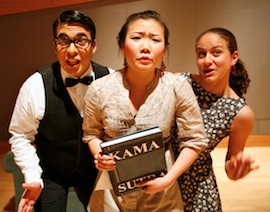 Just a few days ago, San Francisco Conservatory of Music alumna Evgenia Chaverdova was in China, participating in the “I Sing Beijing” program. Today, she is in Amsterdam, with another program for youngsingers. The Moscow-born mezzo is fast approaching 25, both in number of years and of countries visited.
Just a few days ago, San Francisco Conservatory of Music alumna Evgenia Chaverdova was in China, participating in the “I Sing Beijing” program. Today, she is in Amsterdam, with another program for youngsingers. The Moscow-born mezzo is fast approaching 25, both in number of years and of countries visited. “The striking contrast between the East and the West is most fascinating and remarkably apparent,” she writes:
Tomorrow’s concert is in the Concertgebouw, which after the National Centre for the Performing Arts seems like a cozy home. Stark differences between the two, but it’s amazing how music has the power to unite, to transcend, beyond cultural differences, politics, generalizations, stereotypes, preconceived ideas, etc. I find myself so very grateful to be given the opportunity to see the world through the perfect lenses of beauty in music.In China:
From heroically climbing the Great Wall in the rain and gladly tobogganing down to braving the rush hour crowds in order to bargain for pearls at the Silk Market to devouring a delicious Peking duck after an exhilarating Perking Opera marathon to performing Chinese folk songs at the National Theatre, this last month in Beijing has been has been a series of most fortunate, most unforgettable events — sensory experiences galore!
From the List-Maker, Apropos Hurricane Irene
Annoying as at times “Ten Greatest Composers,” “Twenty Greatest Operas,” and similar list controversies can be, there is a list-maker in most of us, so let the battle continue. This week: Storms in operas? Your additions and corrections in the comments field at the end of the column, please.
Britten, Peter Grimes
Berlioz, Les Troyens
Frank Martin, Der Sturm (based on Shakespeare’s The Tempest )
Gershwin, Porgy and Bess
Handel, Atalanta
Janácek, Jenufa
Janácek, Káta Kabanová
Mozart, Idomeneo
Rameau, Les Boreades
Rossini, The Barber of Seville
Verdi, Otello
Verdi, Rigoletto
Weber, Oberon
Zandonai, Giulietta e Romeo
Licitra 'in Battle for His Life'
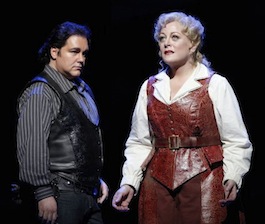 Salvatore Licitra, 43, San Francisco Opera’s Dick Johnson, aka Ramerrez, in last year’s Girl of the GoldenWest, and a Met favorite since his stand-in for the ailing Luciano Pavarotti in 2002, is fighting for his life after a road accident in Sicily.
Salvatore Licitra, 43, San Francisco Opera’s Dick Johnson, aka Ramerrez, in last year’s Girl of the GoldenWest, and a Met favorite since his stand-in for the ailing Luciano Pavarotti in 2002, is fighting for his life after a road accident in Sicily. The 43-year-old tenor lost control of his Vespa, slammed into a wall, suffered cranial injuries, and underwent emergency surgery. His girlfriend, 29, escaped with bruises.
On vacation, Licitra was on his way to collect the Ragusani nel Mondo prize when the accident occurred. He was not wearing a helmet.
Police reports say the couple was traveling at a low speed, of about 30 miles per hour, before the crash. Licitra remains in intensive care.
Fantasia Plus
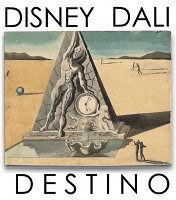 Walt Disney’s Fantasia, responsible for the introduction of millions to classical music, has a virtually unknownsequel. It is Destiny, created in 1945 — yet remaining incomplete for 58 years — in collaboration with the surrealist painter Salvador Dalí.
Walt Disney’s Fantasia, responsible for the introduction of millions to classical music, has a virtually unknownsequel. It is Destiny, created in 1945 — yet remaining incomplete for 58 years — in collaboration with the surrealist painter Salvador Dalí. The brief film is about Chronos, god of time, and his thwarted desire to love a mortal. The Disney production, kept secret for a while, was realized by Dalí and John Hench, a Disney collaborator for 65 years. Their assignment was to prepare a six-minute sequence, combining animation with live dancers and special effects, for a movie in the same format as Fantasia.
Dalí and Hench were creating a new animation technique, inspired by Freud, dwelling into the subconscious. Dalí described the plot of the film as “a magical display of the problem of life in the labyrinth of time.” Disney said it was “a simple story about a young girl in search of true love.”
'Sakhalin Soprano' Almost Thwarted by Hurricane Irene
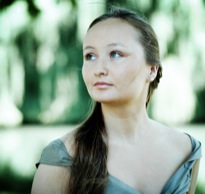 Proud as I am of my un-American familiarity with geography, I couldn’t immediately place this extravagantly praised singer:
Proud as I am of my un-American familiarity with geography, I couldn’t immediately place this extravagantly praised singer: Indecently talented at 21, the Sakhalin soprano Julia Lezhneva made a memorable U.S. debut rising to the loftiest flights with silver-bell purity and apparent ease.
Lezhneva was one of the soloists in the Mozart Requiem; the others also received unusually uniform kudos from Bernheimer: “Joseph Kaiser shaded the tenor solos elegantly, also eloquently. Best of all, Morris Robinson, whose deep and dark bass provided a constant rock-solid foundation, rolled through ‘Tuba mirum’ with wondrous amplitude and endless breath.” The equally praised conductor was Louis Langrée.
About Lezhneva, hearing is believing: take a listen.
In just three years, Lezhneva studied with Dennis O¹Neill at the Cardiff International Academy and participated in master classes by Richard Bonynge, Ileana Cotrubas, Carlo Rizzi, Kiri Te Kanawa, Elena Obraztsova, and Thomas Quasthoff. She is still a student at the Guildhall School of Music and Drama, in a postgraduate vocal course under Yvonne Kenny. Even if she was not as “indecently talented” as she really is, she makes a great impression just with name-dropping.
